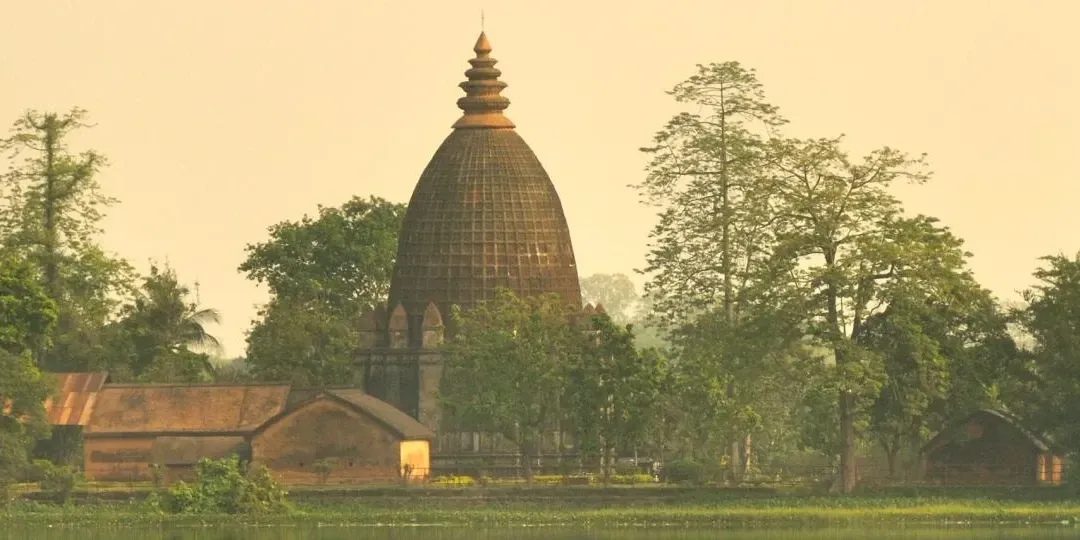
When I was planning this long trip to Assam I always wanted to drive all the way up to Dibrugarh where I studied till class 5. Later, in the final planning stage realized it was too long of a drive. Covering Guwahati, Shillong & Dibrugarh was getting too much in one trip so saved it for a later day. Sivasagar remained in the itinerary for a night stay with a condition if we finish Gibbon-Hollongapar and still have time to explore the ancient capital of the Ahom kingdom.
As we had good sightings in the morning at Hollongapar we decided to move on and explore the Sivasagar area. The hotel Mr. Barua (Wild Grass) recommended was Hotel Brahmaputra. This hotel is near ONGC complex in the town center. We found the hotel room to be OK/OK for a night stay and checked in. He had an early lunch and wanted to explore as much possible of those historical sites. We decided to cover the distance one first and do the close-by the next day and head out to Majuli.
We started with Charaideo Maidams, which is around 30 KM away from the town. The drive was not great as road conditions were bad and we had to navigate big potholes. It took us some time to reach Charaideo. The approach to the site was very nice with canopy cover from the trees. According to history books, it was the first capital of the Ahom kingdom. Now for the Maidams which looks like a small pyramid here are some details below.
Maidams - These lofty maidams are the burial mounds of the Ahom kings and nobles. The Ahom followed an unique mortuary practice to bury their dead kings and nobles in the coffin and an earthen mound of pyramidal shape raised over it. These maidams are hemispherical in shapes ad vary in sizes depending upon the power and status of the buried individual. The hemispherical mound is usually bound by an octagonal enclosure wall with an entrance on the western side and at the top of the mound generally occurs a brick-built structure.
The picturesque forest setting makes this place very ideal for leisure walks with a cool breeze. The Ahom’s continued to bury their royalty here long after they moved their capital elsewhere, and the mounds are still considered sacred.
On our way back from Charaideo we stopped at Kareng Ghar (at Garhgaon) which is around 15 KM away from the town. This brick palace is the last major remnant of the Ahom kingdom’s before they moved their capital to Sivasagar. This is a stepped pyramid-style structure with 4 floors. The top floor has a dome-like roof with a hamber. Kareng Ghar was built first in 1540 but 1752 the current structure was built on the top of the old one as the old one worn out over time. The influence of contemporary Mughals can be seen in the structure. There are four main gates to the palace. It is believed there is a secret tunnel from Kareng Ghar to Talatal Ghar (15 KM). After taking lots of pictures in their well-maintained garden we decided to head back to the town.
We parked our car next to the district court and explored Sivasagar Tank and temples around its famous Shiv Dol, Vishnu Dol & Devi Dol. These three temples are next to each other. Shiva Dol is the tallest, Vishu Dol has finer workmanship. Some might say these temples resemble the famous Kamakhya temple of Guwahati. These temples were built by the Ahom queen Phuleswari.
As the sun was setting down we got some great shots of these temples in golden light. We walked on the tank bank and reached the Assam Tourism hotel which is one of the corners of the Tank.
We had an early dinner called it a day.
The next day, early morning without any breakfast and all we started for the remaining attractions. We started with Joy Sagar Tank another massive man-made water body. It is Asia’s biggest man-made tank. The Sivasagar college was next to it. We wanted to drive along the complete perimeter, but one side is blocked by the Indian Army. I respect a lot Indian Army for their sacrifice and hard work but it is strange how they occupy some central part of a town and causes hindrance to civilian.
We came to Talatal Ghar next, founded by King Rudra Singha. Built-in the 1750s over an earlier wooden palace, it originally had seven stories, three of which were underground (including secret escape tunnels). Now we can visit the two surviving above-ground levels, which have labyrinthine galleries and a large flat roof holding several pavilions.
From there we went to the last attraction Rang Ghar passing Gola Ghar(Amination Storage). And It the best attraction to the Sivasagar area to me. It is a two-story, oval-shaped pavilion built by King Pramatta Singha in 1746. We walked up to the top floor, from where the royalty watched buffalo and elephant fights and other entertainment. The place was under renovation when we visited. The place used to come alive during Bihu festivals.
After this, we had breakfast on the way back to the hotel and left for Majuli.
Read Next
Gibbon Hollongapar Wildlife - Information to know before visiting
Assam & Meghalaya Trip 2018
Majuli Part-II, Day-11 Assam & Meghalaya Trip 2018
Exploring the Satra the foundation of new Assam and its language
